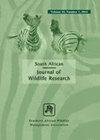Drivers of the Illegal Hunting of Serval (Leptailurus serval) and Oribi (Ourebia ourebi) in the KwaZulu-Natal Midlands, South Africa
引用次数: 9
Abstract
In most marginalized rural areas of developing countries, where employment opportunities and income channels are limited, illegal hunting of wildlife for subsistence and commercial purposes often prevails. Rapid human population growth and the rising demand for bushmeat, particularly in cities where bushmeat has become a popular delicacy, has increased illegal bushmeat harvesting. The extent and drivers of illegal hunting of two important habitat specialists and keystone species in the KwaZulu-Natal Midlands, South Africa, namely oribi (Ourebia ourebi) and serval (Leptailurus serval), are relatively poorly understood. Thus, we interviewed community members in the region (n = 271 interviews) and found that most respondents hunted illegally to acquire meat (82%), as bushmeat was perceived to taste better than domestic meat (46%). However, illegal bushmeat hunting in the region did not represent an important source of livelihood. Oribi were hunted for meat while serval were sought after for the purposes of traditional medicine and for the skin trade. The consideration of site-specific socio-economic drivers of illegal resource use is vital in ensuring effective conservation management for these two species. Our results also provide support for conservation initiatives addressing a wide range of wild animals affected by illegal hunting in this region.南非夸祖鲁-纳塔尔中部地区非法狩猎Serval(Leptilurus Serval)和Oribi(Ourebia ourebi)的司机
在发展中国家最边缘化的农村地区,就业机会和收入渠道有限,为生计和商业目的非法狩猎野生动物的情况经常发生。人口的快速增长和对丛林肉的需求不断增加,特别是在丛林肉已成为流行美食的城市,增加了非法丛林肉的捕捞。在南非夸祖鲁-纳塔尔中部地区,非法狩猎两种重要的栖息地专家和关键物种,即奥里比(Ourebia ourebi)和erval(Leptiurus serval)的范围和驱动因素,人们相对知之甚少。因此,我们采访了该地区的社区成员(n=271次采访),发现大多数受访者非法狩猎以获取肉类(82%),因为人们认为丛林肉的味道比家养肉好(46%)。然而,该地区的非法丛林狩猎并不是重要的生计来源。Oribi被猎杀是为了吃肉,而serval则被用于传统医学和皮肤贸易。考虑到非法资源使用的特定地点的社会经济驱动因素,对于确保对这两个物种进行有效的保护管理至关重要。我们的研究结果也为解决该地区受非法狩猎影响的各种野生动物的保护举措提供了支持。
本文章由计算机程序翻译,如有差异,请以英文原文为准。
求助全文
约1分钟内获得全文
求助全文

 求助内容:
求助内容: 应助结果提醒方式:
应助结果提醒方式:


